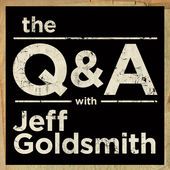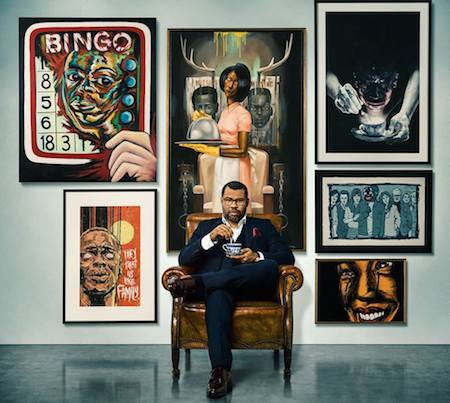I’ve been listening to The Q&A with Jeff Goldsmith Podcast from day one and I can tell you all of the podcast episodes over the years that have made a great impression on me. But today, I only want to talk about one episode.
Recently, Jeff Goldsmith conducted a Q&A with the director and writer of the most talked about movie in theaters now, Jordan Peele (Get Out). There was so much to soak in during this hour-long conversation about screenwriting and filmmaking and I highly recommend taking some time out to listen to the episode and subscribing to the podcast. In the meantime, here are highlights of what stood out to me during the Q&A in which Peele talks about his feature film writing and directing debut, Get Out as well as writing and working on Keanu, Key and Peele, and MADtv.
The first 35 minutes of the podcast are spoiler free while the last half of the interview goes deep into Get Out spoilers as Peele talks about the sunken place and marginalization and so much more.
What Jordan Peele Learned About Screenwriting on MADtv
“MADtv was an interesting experience because I don’t think that the show really matched my comedic sensibilities. They were really into the recurring character and I was kind of into this idea of sketches, like, you walk the edge, you fucking push the boundaries, and that’s what sketches are about – so I would write myself these sketches that were maybe a little esoteric or ricky or some way out of the box and they just wouldn’t go. So, I got a lot of experience writing shit that would never get made. Basically. But also kind of figuring out how to take my voice and eventually make something that would work with the show and work with my voice, by the end of that experience. So, that’s one of the things that I learned…how to make these two things work, this square object and this round hole, and let’s make a sketch that satisfies both of these things.”
On What He Learned Working While on Keanu, His First Feature Film As a Screenwriter
“It was a plan that was executed and I think we knew that we would be in a place where a Key and Peele would be interesting to some people in a couple of years when we wrote it. So for me it just shows that a certain amount of strategy can work if it’s right. I love that movie, I think Peter Atencio (Director) did an amazing job. If I could do it all over again, I would spend a little more time on the script. I would just give it more rewrites. I would go in for more detail, more character development, more laughs, just all over. Every time I look at a script and go through it, you can find something new. Something that worked for me on this, I’d do like 400 passes of the thing, I’m exaggerating but it felt like 400 passes… you sit down and look at your script and say, ‘You know what, I’m going to look through it and make sure that every character has their own voice and it’s not all my voice through the character. Okay, this time I’m just gonna go through and make sure that all of the fucking scary parts are scary.’ So just take a precision project and rewriting is fun when you give yourself those detailed assignments.”
On His Inspiration for Get Out
“I can’t say that this one is about my wife or my wife’s family. But I actually wrote this before I met Chelsea (Peretti) so I came to the table with this baggage. One of the lessons I took from Guess Who’s Coming to Dinner which is one of the influences here is that…one of the reasons I think that film was so effective in its discussion with race is because it started with a situation that was universal. Take the race out of it and everybody can relate to the fear of meeting your potential in-laws for the first time. So at some point, I had a revelation that that was also the way to get into this film. In general, I’m a proud African American man and I see the world through an African American lens. This movie is very personal. It’s about bringing representation to a genre where I think Black people aren’t represented and it’s about giving us all a collective sort of experience in seeing through the eyes of a minority, seeing through the eyes of someone who in this situation feels like he is the other, like he is the other. I think people who recognize that experience will recognize the feeling. I think people who don’t have that experience or don’t recognize it will have a little of a, ‘Oh shit! I was gonna say that I like Tiger Woods but I don’t think that I should say that anymore’ (laughs). I think a big part of what makes story, as an art form, one of the most important pieces of communication in the world, is that with a movie, with a book, with something that has a protagonist, that’s one of the only ways we can see through someone else’s eyes. If the story is given the emotional continuity and that reality, we’re all on the same page when we watch this movie.”
On Outlining
“Yeah. I’m the kind of guy who wants to know the entire movie before I write it. The same with sketch. The nugget for this idea and several others started maybe eight years ago. After MADtv, I was sort of like, ‘Oh shit, what do I do now? Okay, well, let’s just write for fun. It doesn’t matter if these are ever going to go anywhere, what’s the most fun movie I can write for myself? What’s the movie that doesn’t exist that I want to see?’ The whole idea was, let’s become a better writer through this. That sort of gave birth to this idea. I outlined this along with other ideas for about five years before I realized this one was the one that was complete.”
On Writing
“Follow the fun. Follow what is fun to write. The second you’re sick of the idea that you’re working on, which will happen, sometimes almost immediately, move to the idea that is now fun. This isn’t going anywhere. Go, follow the fun. If this one is fucked up, move to the next fun one. I had five projects opened at once before I realized, ‘Oh, you know what, this one is starting to make a whole different kind of sense. That’s Get Out. Okay, let’s focus on this.” But don’t accept writer’s block.” The second you’re bored, you’re already doing something wrong. Find the fun.
This was something that I found after years and years of dealing with writer’s block. Eight years ago, I found myself really feeling like I wanted to do this but I lacked the skill to pull off my favorite movie. So the point of writing to me sort of shifted from MADtv, getting something on the air, to every time I go out, I get excited about going back home and cracking it open. So, it was a revelation I had about halfway into my writing career.”
On Directing
“The big takeaway is that you have to be aggressively able to evolve. Everyday you’re going to hit these obstacles. Take a cue from how Steven Spielberg crafted Jaws. When he hit these obstacles, he took the reality of these obstacles and he turned them into a choice that literally made the movie better. You guys know the Spielberg thing where the shark would never fucking work so he had to not show the shark for most of the movie which ends up being one of the great horror choices there is. So for me, I got to a point where, the inevitable thing that goes wrong, I looked at as a gift. Any obstacle is an opportunity to make a better choice or another good choice.”
Get tickets to Get Out in theaters now.
Subscribe to The Q&A with Jeff Goldsmith on iTunes.

